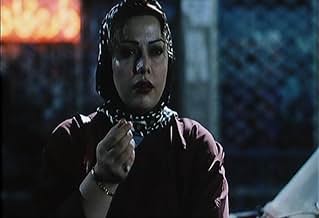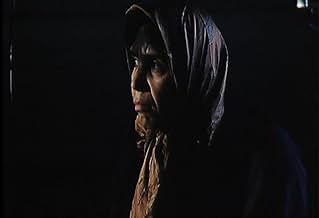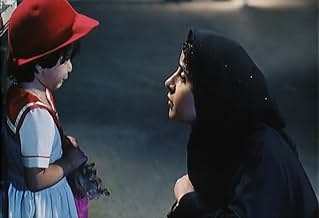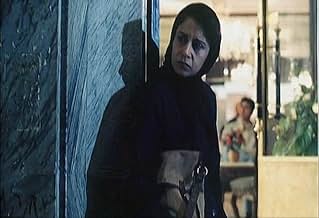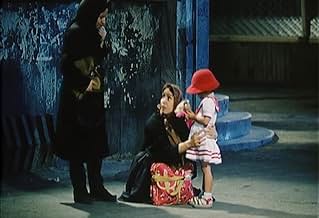Varias mujeres luchan por funcionar en la sociedad opresivamente sexista del Irán contemporáneo.Varias mujeres luchan por funcionar en la sociedad opresivamente sexista del Irán contemporáneo.Varias mujeres luchan por funcionar en la sociedad opresivamente sexista del Irán contemporáneo.
- Dirección
- Guionistas
- Elenco
- Premios
- 12 premios ganados y 7 nominaciones en total
Maryiam Palvin Almani
- Maryam Parvin Almani (Arezou)
- (as Maryam Parvin Almani)
Fereshteh Sadre Orafaiy
- Fereshteh (Pari)
- (as Fereshteh Sadr Orafai)
- Dirección
- Guionistas
- Todo el elenco y el equipo
- Producción, taquilla y más en IMDbPro
Opiniones destacadas
After making two feature films and many short films on children, director Jafar Panahi makes a film The Circle where he deals with the condition of a wider gamut of the female gender (a girl child, a girl toddler left behind for adoption. a wide-eyed teenage girl, a pregnant mother whose spouse has been executed, a prostitute, the only wife of an expatriate doctor, the less-preferred first wife of a husband with two wives, a grandmother who wishes for a male grandchild, a possibly unmarried mother who can no longer support her girl child) in Iran.
"The circle" begins and ends with a name of a woman--Solmaz Gholami--being called out through a door hatch. Interestingly, the film never introduces us to this character. It is apparently the name of a woman who has given birth to a girl child. The film introduces us to the grandmother of the child who is informed by the nurse that the newborn is a girl. The hatch belongs to a white door of an operation theater in a hospital.
The film ends with the same name being called out from a similar hatch of another doorthis time a prison door of a room that holds most of the female adult characters in the film rounded up for varied offenses. Implicitly the film states that women face discrimination from birth until death in Iran. Evidently someone had stated a white lie earlier that the unseen Ms Gholami was to have a baby boy after an ultrasound test of the foetus. The revised information of the arrival of the girl child upsets the grandmother who wants a boy grandchild.
In between the opening of the two hatches, the roving hand-held camera underlines the state of an unusual group of women in Teheran, without IDs or male support evading police and eve-teasing males. The viewer is informed that most of the women (except the grandmother and two children) have either been paroled from prison or have escaped prison and are therefore on the run from the cops. Their original crimes are never stated. One woman is picked up by the police while she is making a call from a public phone booth. Once imprisoned, the women are afraid of the blot in their lives to the extent that they hide it from their husbands! Were they imprisoned for sexual offenses? None of the women seem to be politically active. However, the film underlines one fact-had they either a husband or a father, or even a student ID, they would have no problem. Some of these women who want to smoke a cigarette. They can only do so when the men (in the film, a policeman) are smoking in public!
Mr Panahi is able to present interesting aspects of intra-female bonding in Iran. Some women travel the extra mile to help other women in distress. Even a prostitute helps another woman to escape the police. Then there are women who do not help others because they do not want their husbands to know that they were once behind bars. A mother leaves her girl child in the street in the hope that a stranger will provide a better life for her child. Yet they do not wallow in self pity. Who are these women with no husbands and having shady pasts? They are definitely not the typical Iranian woman.
Any woman or sensitive man could be seduced by the subject of the film. However, the film ought to be evaluated beyond the obvious feminist issues-it is a study of individuals born into any society that deprives them of equal privileges. One of the reasons for my argument is that many men shown in the film are caring men who help women in trouble rather than become their exploiters. Some policemen shown are corrupt, but some are decent chaps. Many men in the film do respect women. There are also intolerant men who are ready to kill their sister who is pregnant without a husband. "The circle" cannot be a feminist film merely just because the female form covered in burkha/chador indicates repression. The film is more humanist than feministwhich the director has claimed in interviews. One tends to agree with Mr Panahi on this point.
However, it is a fact that to abort a child in Iran is a difficult proposition as it would be in most countries today. It would be difficult in most countries for any young girl without an ID to take a long distance bus ride all alone in the night. Iranian women enjoy more relative freedom than their counterparts in Saudi Arabiawhere women cannot even drive a car! Panahi's women in "The Circle" seem to be women who were incarcerated for some "unknown" crimes-never clearly elucidated in the film except in the case of the prostitute. If they were political prisoners, there is no clue except that a pregnant woman states that her spouse has been recently executed for a crime. There is a wide eyed girl who has never seen her village in recent years, who makes the viewer wonder why she was imprisoned in the first place. Panahi's film seduces the viewer, until you begin to wonder, if even the fact that the film was banned in Iran, is a viewer-seduction tool (almost all good Iranian films are banned in Iran, even though they have no sex or violence, but are possibly remotely critical of the present regime). The film was shot in Teheran and evidently the government did not have any problems at that time with the script. And then, bingo, it gets banned!
"The circle" is an interesting film that offers considerable fodder for thought. As cinema, it is without doubt an intelligent work and deserved the Golden Lion at the Venice film festival. Yet it is a film that calls for close evaluation by an astute mind rather than the heart of an impartial impressionable viewer.
"The circle" begins and ends with a name of a woman--Solmaz Gholami--being called out through a door hatch. Interestingly, the film never introduces us to this character. It is apparently the name of a woman who has given birth to a girl child. The film introduces us to the grandmother of the child who is informed by the nurse that the newborn is a girl. The hatch belongs to a white door of an operation theater in a hospital.
The film ends with the same name being called out from a similar hatch of another doorthis time a prison door of a room that holds most of the female adult characters in the film rounded up for varied offenses. Implicitly the film states that women face discrimination from birth until death in Iran. Evidently someone had stated a white lie earlier that the unseen Ms Gholami was to have a baby boy after an ultrasound test of the foetus. The revised information of the arrival of the girl child upsets the grandmother who wants a boy grandchild.
In between the opening of the two hatches, the roving hand-held camera underlines the state of an unusual group of women in Teheran, without IDs or male support evading police and eve-teasing males. The viewer is informed that most of the women (except the grandmother and two children) have either been paroled from prison or have escaped prison and are therefore on the run from the cops. Their original crimes are never stated. One woman is picked up by the police while she is making a call from a public phone booth. Once imprisoned, the women are afraid of the blot in their lives to the extent that they hide it from their husbands! Were they imprisoned for sexual offenses? None of the women seem to be politically active. However, the film underlines one fact-had they either a husband or a father, or even a student ID, they would have no problem. Some of these women who want to smoke a cigarette. They can only do so when the men (in the film, a policeman) are smoking in public!
Mr Panahi is able to present interesting aspects of intra-female bonding in Iran. Some women travel the extra mile to help other women in distress. Even a prostitute helps another woman to escape the police. Then there are women who do not help others because they do not want their husbands to know that they were once behind bars. A mother leaves her girl child in the street in the hope that a stranger will provide a better life for her child. Yet they do not wallow in self pity. Who are these women with no husbands and having shady pasts? They are definitely not the typical Iranian woman.
Any woman or sensitive man could be seduced by the subject of the film. However, the film ought to be evaluated beyond the obvious feminist issues-it is a study of individuals born into any society that deprives them of equal privileges. One of the reasons for my argument is that many men shown in the film are caring men who help women in trouble rather than become their exploiters. Some policemen shown are corrupt, but some are decent chaps. Many men in the film do respect women. There are also intolerant men who are ready to kill their sister who is pregnant without a husband. "The circle" cannot be a feminist film merely just because the female form covered in burkha/chador indicates repression. The film is more humanist than feministwhich the director has claimed in interviews. One tends to agree with Mr Panahi on this point.
However, it is a fact that to abort a child in Iran is a difficult proposition as it would be in most countries today. It would be difficult in most countries for any young girl without an ID to take a long distance bus ride all alone in the night. Iranian women enjoy more relative freedom than their counterparts in Saudi Arabiawhere women cannot even drive a car! Panahi's women in "The Circle" seem to be women who were incarcerated for some "unknown" crimes-never clearly elucidated in the film except in the case of the prostitute. If they were political prisoners, there is no clue except that a pregnant woman states that her spouse has been recently executed for a crime. There is a wide eyed girl who has never seen her village in recent years, who makes the viewer wonder why she was imprisoned in the first place. Panahi's film seduces the viewer, until you begin to wonder, if even the fact that the film was banned in Iran, is a viewer-seduction tool (almost all good Iranian films are banned in Iran, even though they have no sex or violence, but are possibly remotely critical of the present regime). The film was shot in Teheran and evidently the government did not have any problems at that time with the script. And then, bingo, it gets banned!
"The circle" is an interesting film that offers considerable fodder for thought. As cinema, it is without doubt an intelligent work and deserved the Golden Lion at the Venice film festival. Yet it is a film that calls for close evaluation by an astute mind rather than the heart of an impartial impressionable viewer.
While reading the various interviews with Jafar Panahi concerning his latest film "The Circle", I noticed that he always stresses the fact that his film is not a feminist film, but a humanist film. I'm reminded of the times I've been in a political conversation with someone and they've said "I'm no feminist but..." and then said something in defense of women's rights. Well, whether he intended it or not, Panahi has made a feminist film, because after all, feminism in its most basic form has nothing to do with hating men, but is merely a desire for the fair and equal treatment of women, and equal human rights is of course a cornerstone of humanism. I'm no scholar (and that I can say in all honesty) but yes, I would say I'm a feminist. I've never been on a march, and I've never read the works of any great feminist theorists, but to the core of my soul I believe in the equal and fair treatment of women, and if that doesn't make me a feminist I don't know what does.
Of course, all this discussion about feminism wouldn't matter if "The Circle" wasn't such a strong film. Panahi's film, almost universally praised, will receive no negative criticism here either. His use of narrative (most reviews compare the narrative style to "La Ronde" [1950], but I suppose comparisons could be made with "The Phantom of Liberty" [1974] and "Slacker" [1990], for that matter) might be perceived by some rob the characters of their individuality, but of course that is part of the point. In Iran today women are all grouped together, Panahi is saying, and they are seen as no more that a collective problem for men to deal with. Ultimately, there is nothing I can say about this film that hasn't been said before, but I wanted a chance to express my appreciation for this extraordinary myself.
Of course, all this discussion about feminism wouldn't matter if "The Circle" wasn't such a strong film. Panahi's film, almost universally praised, will receive no negative criticism here either. His use of narrative (most reviews compare the narrative style to "La Ronde" [1950], but I suppose comparisons could be made with "The Phantom of Liberty" [1974] and "Slacker" [1990], for that matter) might be perceived by some rob the characters of their individuality, but of course that is part of the point. In Iran today women are all grouped together, Panahi is saying, and they are seen as no more that a collective problem for men to deal with. Ultimately, there is nothing I can say about this film that hasn't been said before, but I wanted a chance to express my appreciation for this extraordinary myself.
Devastating film that details the harsh treatment of women in Iran. The film begins with a hospital scene, where a family take the news of a new baby girl in the family so harshly that one would think the child had been stillborn. Following that the story introduces us to a group of women, one after the other, each of them recent convicts (in Iran a woman is put in jail indefinitely for riding in a car with a man she is not related to) who have their own struggles to overcome before they can seek asylum from the clausterphobic society that surrounds them. The film isn't as satisfying as it should be (even given its subject matter), and definitely deserves to be more engrossing. It is, however, an important human rights issue worth examining and for all it shows of a world as different from our North American society, it deserves a good look from us all.
I have seen several Iranian films in the past few weeks thanks to a short season of the films screened in the UK by Channel 4 a channel that can rise above the level of reality television when it puts its mind to it. Having seen them in a compact space of time, I had quickly gotten it in my head that many of those screened had come to international attention and various degrees of acclaim because they were "issue" films that looked at some aspect of Iranian life with at least a semi-critical eye. However none of them came close to the sort of anger with the system that was evident throughout this film.
The plot sees several stories that weave around one another to produce a film that looks at several women, all of whom are suffering in some way or other due to the general treatment of women in Iran. As a dramatic device it doesn't totally work because too little time is spent with each character to really get to know them or get into their stories and situations, but this struck me as being the film's second aim with the first quite clearly being the injustice with which women are treated. As such, the narrative never really engaged me in terms of the people in the story, but the general picture painted was interesting enough to hold my attention and make me care for the characters generally, even if I would struggle to put names to faces.
The actresses are all pretty good and most come off pretty natural and convincing, with only the odd moment here and there not really working. They all strike a rather tragic note with each of them trying to make out the best they can in life but really oppressed in so many ways whether it is small things like not easily moving in the streets by themselves or being rejected by their families to save honour. The direction is good, with different styles used for some of the characters but done in a subtle way to the point where I didn't notice until somebody pointed it out to me.
Overall this is a good film but not a brilliant one mainly because the narrative comes secondary to the criticism of the system. However it is worth seeing mainly because, without really ranting, it holds a lot of anger at the status of Iranian women and their treatment and the injustice within the system it may not be balanced but it is interesting and engaging.
The plot sees several stories that weave around one another to produce a film that looks at several women, all of whom are suffering in some way or other due to the general treatment of women in Iran. As a dramatic device it doesn't totally work because too little time is spent with each character to really get to know them or get into their stories and situations, but this struck me as being the film's second aim with the first quite clearly being the injustice with which women are treated. As such, the narrative never really engaged me in terms of the people in the story, but the general picture painted was interesting enough to hold my attention and make me care for the characters generally, even if I would struggle to put names to faces.
The actresses are all pretty good and most come off pretty natural and convincing, with only the odd moment here and there not really working. They all strike a rather tragic note with each of them trying to make out the best they can in life but really oppressed in so many ways whether it is small things like not easily moving in the streets by themselves or being rejected by their families to save honour. The direction is good, with different styles used for some of the characters but done in a subtle way to the point where I didn't notice until somebody pointed it out to me.
Overall this is a good film but not a brilliant one mainly because the narrative comes secondary to the criticism of the system. However it is worth seeing mainly because, without really ranting, it holds a lot of anger at the status of Iranian women and their treatment and the injustice within the system it may not be balanced but it is interesting and engaging.
The "circle" in Jafar Panahi's great film is many things: the
structure of the film itself, which ends with the same image it
begins with; a location in Teheran, where a character meets a
friend in a movie theater; the circular stairs so many other
characters run up and down; the circling, hovering camera
movements that bring us face to face with the women in these
interlinked stories and the world they are caught in. Most of all,
perhaps, it is the constricting circle within which Iranian women
must live their lives, the tightly circumscribed rules and
expectations of a rigidly masculine universe. None of Panahi's
characters can escape this circle, though some try and one, at
least, believes that she can. The more experienced know the truth;
all they can do in running is map out the circumference of their
shrunken world.
It's easy to see The Circle as a film about the oppression of
women in Iran, but that would reduce it to the merely political--and
we should not forget that the film was made by an Iranian man,
and that three quarters of the Iranian electorate recently voted to
reelect President Khatami, a deeply intelligent voice for freedom
and dialogue who has had his own difficulties being heard.
Panahi's subject is far larger; a woman who grew up in an abusive
household told me that no other film had so accurately depicted
the experience of her youth, when the constraints on women's
lives were so much taken for granted that she was unaware there
was anything outside them. But those constraints are fatal. We
make our world together, through dialogue and interaction. To
deprive someone of voice and the chance to participate in that
process is to kill them, whether it is done through religious and
social sanctions or by a husband beating his wife. Panahi's
women are neither dead nor silent, even though their only
listeners are other women. Their tragedy finds echoes everywhere;
but in this film where theme and expression are so intimately
joined we, at least, can hear them.
structure of the film itself, which ends with the same image it
begins with; a location in Teheran, where a character meets a
friend in a movie theater; the circular stairs so many other
characters run up and down; the circling, hovering camera
movements that bring us face to face with the women in these
interlinked stories and the world they are caught in. Most of all,
perhaps, it is the constricting circle within which Iranian women
must live their lives, the tightly circumscribed rules and
expectations of a rigidly masculine universe. None of Panahi's
characters can escape this circle, though some try and one, at
least, believes that she can. The more experienced know the truth;
all they can do in running is map out the circumference of their
shrunken world.
It's easy to see The Circle as a film about the oppression of
women in Iran, but that would reduce it to the merely political--and
we should not forget that the film was made by an Iranian man,
and that three quarters of the Iranian electorate recently voted to
reelect President Khatami, a deeply intelligent voice for freedom
and dialogue who has had his own difficulties being heard.
Panahi's subject is far larger; a woman who grew up in an abusive
household told me that no other film had so accurately depicted
the experience of her youth, when the constraints on women's
lives were so much taken for granted that she was unaware there
was anything outside them. But those constraints are fatal. We
make our world together, through dialogue and interaction. To
deprive someone of voice and the chance to participate in that
process is to kill them, whether it is done through religious and
social sanctions or by a husband beating his wife. Panahi's
women are neither dead nor silent, even though their only
listeners are other women. Their tragedy finds echoes everywhere;
but in this film where theme and expression are so intimately
joined we, at least, can hear them.
¿Sabías que…?
- TriviaPanahi adopted a different camera style to depict each of the four main protagonists' lives. For the first, an idealistic woman he used a handheld camera. For the second woman, the camera is mounted on a constantly moving dolly. The third woman's story is told at night in darker outside, and the camera is static with pans and tight close ups. For the last, least optimistic woman both the camera and the woman are completely immobile and very little sound is used.
- ConexionesFeatured in Cinema Iran (2005)
Selecciones populares
Inicia sesión para calificar y agrega a la lista de videos para obtener recomendaciones personalizadas
- How long is The Circle?Con tecnología de Alexa
Detalles
- Fecha de lanzamiento
- Países de origen
- Sitio oficial
- Idioma
- También se conoce como
- The Circle
- Locaciones de filmación
- Productoras
- Ver más créditos de la compañía en IMDbPro
Taquilla
- Presupuesto
- USD 10,000 (estimado)
- Total en EE. UU. y Canadá
- USD 440,554
- Total a nivel mundial
- USD 756,035
Contribuir a esta página
Sugiere una edición o agrega el contenido que falta


